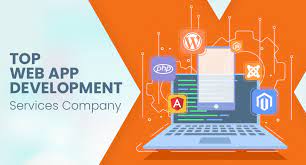Blog






8 Most Popular Backend Frameworks for Web App Development in 2023
2023-02-24

Introduction
Developing web applications is no easy task—especially when you consider the sheer number of backend frameworks and tools available. Choosing the right framework for your web app development project can mean the difference between success and failure. With this in mind, it’s important to understand which frameworks are most popular in today’s market and how they differ from one another. In this blog post, we will explore the 8 most popular backend frameworks for web app development in 2023, including their features and benefits. Keep reading to learn more about each framework and find out which one may be best for your project.
What is a Backend Framework?
A backend framework is a software framework that enables you to build the server-side of web applications. It provides a structure for you to develop the code and adds pre-built functionality, so that you don't have to start from scratch. This can make development faster and easier, as well as improve the overall quality of your code.
There are many different backend frameworks available, each with its own strengths and weaknesses. The most popular backend frameworks for web app development are:
- Laravel
- Ruby on Rails
- Express.js
- Django
Each of these frameworks has a large community of developers and a wide range of resources available, making them a good option for web app development.
8 Most Popular Backend Frameworks in 2023
There are a number of backend frameworks available for web app development, each with its own advantages and disadvantages. In this article, we'll take a look at the most popular backend frameworks in 2023 and what makes them stand out from the rest.
1. Laravel: Laravel is a PHP framework that offers an expressive and elegant syntax. It's easy to use and provides a wide range of features, making it one of the most popular frameworks for web app development.
2. Ruby on Rails: Ruby on Rails is another popular choice for web app development. It's known for its convention over configuration approach, which makes it easy to get started with and reduces the amount of boilerplate code you need to write.
3. Express: Express is a lightweight JavaScript framework that's perfect for building high-performance web apps. It has a simple API and comes with a range of features that make it easy to get started with and scale as your needs grow.
4. Django: Django is a Python framework that enables you to create complex, database-driven websites. It's highly scalable and comes with plenty of built-in features, making it one of the most popular choices for large-scale web app development projects.
- Laravel
Laravel has been gaining popularity lately as a backend framework for web app development. In this article, we will discuss some of the features that make Laravel an attractive option for developers.
Laravel is built on top of the Symfony PHP framework and shares many of its components. This makes it easy for developers who are already familiar with Symfony to get started with Laravel. Laravel also includes a templating engine called Blade, which makes it easy to write clean and maintainable code.
Laravel comes with a number of built-in features, such as authentication, authorization, caching, and database management. It also includes support for queuing and scheduling jobs, which can be very useful for large applications. Laravel's documentation is excellent and provides detailed instructions on how to use all of its features.
If you're looking for a backend framework that is easy to learn and provides a lot of built-in features, Laravel is definitely worth considering.
- Symfony
In the past decade, PHP has experienced a renaissance, and one of its most celebrated results is the Symfony framework. It is open source, well-documented, and comes with a set of toolkits that can facilitate rapid development.
What’s more, it’s easy to create high-quality websites and web apps with this framework. And since it’s been around for a while now, there’s an expansive community of experts you can turn to for guidance.
- Spring Boot
Spring Boot is a popular framework for web application development. It is based on the Java Spring framework and provides a number of features that make it easy to develop web applications. Spring Boot is also easy to deploy and can be run on a variety of platforms.
- Django
Django is a high-level Python Web framework that encourages rapid development and clean, pragmatic design. Built by experienced developers, it takes care of much of the hassle of Web development, so you can focus on writing your app without needing to reinvent the wheel. It’s free and open source.
Django was designed to handle two problems that commonly occur in web development: the configuration and URL routing for databases and front-end design. When a project is created in Django, a “project” folder is generated that contains all the necessary files for a web application, including a manage.py file which is used to start the app.
Django also offers an optional administrative interface, which can be used to quickly build CRUD applications without having to write any boilerplate code. The admin interface comes with built-in authentication and can be customized to suit your needs.
- ASP.NET Core
ASP.NET Core is a cross-platform, open-source framework for building modern web applications. It can be used to build apps for Windows, Mac, and Linux. ASP.NET Core is a successor to the ASP.NET framework and was designed to provide a more modular and efficient way of building web apps.
ASP.NET Core includes a number of features that make it an attractive choice for web app development:
- It supports multiple programming languages, including C#, F#, and Visual Basic.
- It has a built-in dependency injection system that makes it easy to use third-party libraries.
- It uses the Model View Controller (MVC) pattern for structuring code, which makes it easier to maintain and extend large applications.
If you're looking for a powerful and flexible framework for building web applications, ASP.NET Core is definitely worth considering.
- Node.js
Node.js is a popular backend framework for web app development. It is open source, scalable, and easy to use. Node.js provides an asynchronous event-driven programming model that makes it perfect for developing real-time applications. It also has a large community and a rich ecosystem of libraries and tools.
- Express.js
Express.js is a web application framework for Node.js. It is the most popular backend framework for web app development in 2019 according to the Stack Overflow Developer Survey. Express is a minimal and flexible framework that provides a wide range of features for web and mobile applications.
Some of the key features of Express.js are:
- Robust routing
- HTTP helpers (e.g., path matching, redirects, etc)
- Middleware support
- View system support
Express.js is a great choice for developers who are looking for a fast, lightweight, and unopinionated framework to build their web applications.
- Ruby on Rails
Ruby on Rails is one of the most popular backend frameworks for web app development. It is a full-stack framework that provides everything you need to create a web application from scratch. Ruby on Rails is known for its ease of use, flexibility, and scalability.
If you are looking for a backend framework to develop your next web application, then Ruby on Rails should definitely be on your list.
Benefits of Using a Backend Framework for Web App Development
When it comes to Web App Development Company Melbourne, there are many benefits to using a backend framework. Perhaps the most obvious benefit is that it can help speed up the development process by providing a structure for your code. This can save you a lot of time and effort in the long run, as you won't have to waste time reinventing the wheel each time you start a new project.
Another benefit of using a backend framework is that it can provide you with a higher level of security for your web app. This is because most backend frameworks come with built-in security features that can help protect your app from common attacks.
Finally, another great benefit of using a backend framework is that it can make your web app more scalable. This means that if you ever need to add more features or functionality to your app, it will be much easier to do so if you're using a backend framework.
Conclusion
As you can see, there are many popular backend frameworks for Web App Development Company Melbourne in 2023. Each of them provides its own set of features and benefits that aid developers in creating secure and robust applications quickly. Depending on the type of project you are working on, it is important to research all your options carefully before deciding which one best suits your needs. We hope this article has given you a better understanding of the different types of backend frameworks available so that you can choose the right one for your project.





























